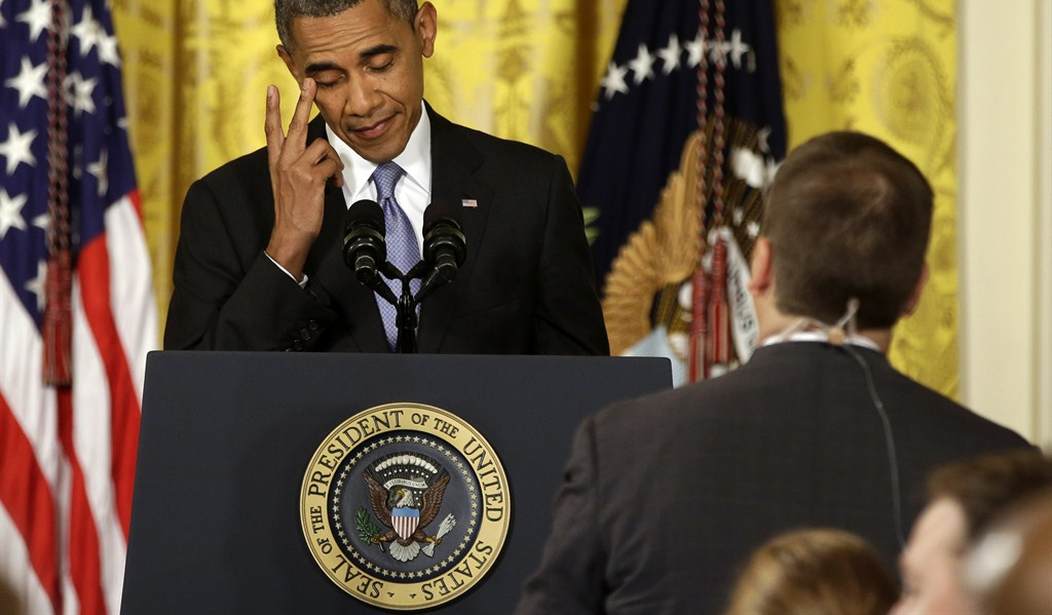President Obama held a press conference for the first time since April this afternoon, fielding questions on a broad array of subjects. Some quick thoughts:
NSA surveillance: Obama said he's confident that US government spying capabilities are not being abused, but acknowledged that recent revelations have stirred increased skepticism among the American people. Among several reforms, he proposed a oversight board (a new layer of bureaucracy) to review current policies, tasking its members with offering an initial assessment in two months. In his remarks, the president again outlined a balancing test between civil liberties and national security -- distinctions he once rejected as "false choices." Obama's primary message was that the NSA program is fundamentally a PR problem, not a policy one. As I've written previously, the public relations issue he laments has been compounded by the swirl of scandals that have engulfed Washington in recent months. People distrust big government for a reason. Later, the president chided Russia for its decision to grant asylum to Edward Snowden, whom he pointedly declined to call a "patriot." Obama danced around the tensions that have come to define his relationship with Vladimir Putin, underscoring how ineffective the administration's "reset" with Russia has been.
Al Qaeda and the War on Terror: The president stood by his brash, pre-election assertions that his administration had "decimated" core Al Qaeda. He did so despite a rash of recent embassy closings amid heightened threat levels. He cited a post-election speech as supposed proof that he's always qualified his bravado, but even liberals like columnist Kirsten Powers couldn't quite buy that line, especially in light of Obama's previous self-congratulatory rhetoric:
Recommended
Here we go with the word games on al-qaeda. Where did anyone get the idea that Obama said that they were basically defeated?
— Kirsten Powers (@kirstenpowers10) August 9, 2013
Obama asserted that US efforts have crippled Al Qaeda's large-scale capabilities, although he didn't mention the organization's successful coordinated prison break in Iraq, which freed several leading radicals. The president would not comment on the recent uptick in lethal drone strikes in Yemen and elsewhere -- but the resurgence of AQAP is throwing a major wrench into the White House's reckless plan to close Guantanamo Bay.
Benghazi: Correspondent Ed Henry challenged the president, reminding him of his vow last September to bring the perpetrators of the attacks to justice. Obama responded by citing the DOJ's new sealed indictment against one attacker, and quipped that he also once said he'd get bin Laden -- but that it took more than 11 months to come to fruition. Except bin Laden was one man, and nobody knew where he was until we raided his compound and terminated him. The Benghazi massacre was carried out by dozens of jihadists, several of whom our government identified and located months ago. None of them have been held accountable for their slaughter, and that lack of accountability is highly politicized. Thus, Obama's OBL comparison was specious. He was not asked about, and did not mention, last week's CNN scoop regarding unprecedented attempts by the CIA to lock down Benghazi secrets.
Obamacare: This president is in his element when he's attacking Republicans, for whom he reserved much harsher criticism than he did for, say, Vladimir Putin. He waved away a question about whether he has the authority to unilaterally amend the law after the fact, arguing that he did so "in consultation" with others. Based on this standard, one supposes he must also believe that future Republican presidents will have the power amend, suspend, or alter the law after similar so-called consultations, right? He quickly pivoted to attacking Republican straw-men, alleging that GOP opposition to Obamacare is based on a desire to deny sick and poor people healthcare. This suggestion is petulant, slanderous, unpresidential, and entirely predictable coming from Barack Obama. He insinuated that he's relied on unilateral action to "fix" his signature law because Congressional Republicans are obstructionists. He failed to mention that Republicans offered to codify the employer mandate delay in legislation, prompting a veto threat. He also flat-out lied in stating that Republicans have no plans to replace Obamacare. That's simply false, and has been false for years. He reiterated his theory that Republicans oppose Obamacare because they want to block health services for 30 million Americans. Three points: (1) The American people oppose Obamacare. Are they also motivated by cruel sadism? (2) The CBO says that it's Obamacare that leaves 30 million Americans uninsured, in spite of its heavy regulations, harmful provisions, and exorbitant expense. Why does Barack Obama hate uninsured people? (3) He's engaging in these scurrilous attacks because smearing opponents is easier than seriously addressing the implosion of his law. Also, if the law is so wonderful (Obama again reminded the ungrateful public that they're already "benefiting" from his delightful law), why did Congress seek and receive a last-minute escape clause from it?
Immigration: Obama touted the Senate-passed bill and urged the House to take it up when members return from August recess. He said the roadblocks to reform in the House are a product of petty Republican infighting, effectively dismissing the notion that millions of people oppose the current proposals for fair-minded reasons. He noted that no law is 100 percent effective, so critics will always find minor quibbles with proposed solutions. That's true, and I'm a supporter of reform, but in the case of the White House-backed Senate bill, the CBO says it would only curtail illegal immigration by 33 to 50 percent. How ineffective must a potential law be before the president decides people may have legitimate cause to oppose it?

























Join the conversation as a VIP Member